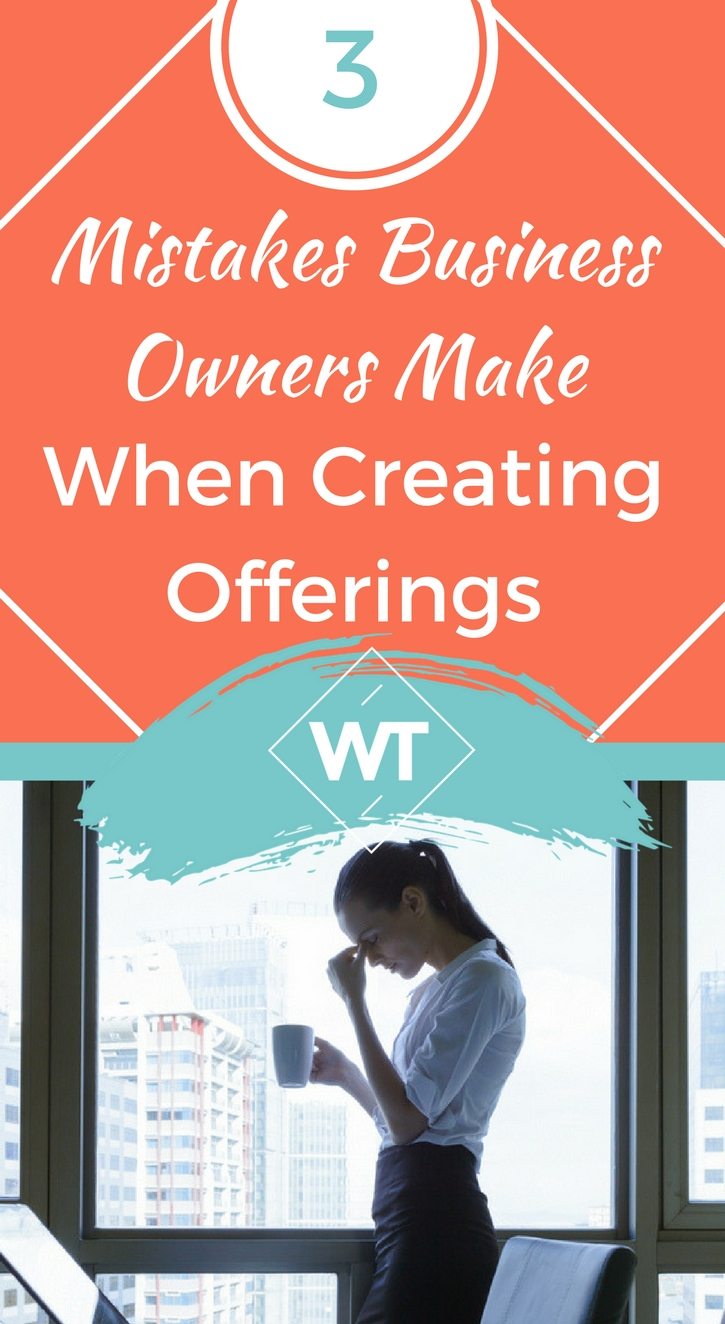3 Mistakes Business Owners Make When Creating Offerings

Business owners come to me all the time in a whirlwind of emotion because their offerings aren’t selling. Or worse, they’ve sold a few units but people are asking for refunds! On the emotional side, they consider themselves failures. They put all of their effort into this offering and are hearing crickets as soon as it’s live.
This is usually the first obstacle I have to get business owners through when I coach them. If these business owners are wrapped up in their emotions and mentally berating themselves, we can’t get to the core of why their offerings aren’t selling. After reassuring them that every business owner goes through this at some point, they calm down and I can dig a little deeper. I ask them to walk me through the process of how this product was created and launched. By this point I usually know the answer, but I want to hear it out of their mouths.
It doesn’t take long for my suspicions to be validated. I’ve been coaching long enough to know the patterns as to why a business owner’s products are not selling.
Most common mistakes business owners make:
In this article I’m going to lay out for you mistakes business owners make so you can avoid a similar fate.
1. They didn’t create a product from the POV of the audience
This is a mistake that all business owners make at some point—especially in the beginning if they aren’t yet experienced. However, don’t make the assumption that what I’m about to talk about is a rookie mistake. This is one of the mistakes business owners make —and yes, even seasoned entrepreneurs fall into this trap as well.
When products aren’t selling, one of the first mistakes business owners make is usually that the business owner created an offering they thought their audience wanted. In other words, instead of doing proper market research and letting their market dictate the offering, they thought everything through from the perspective/POV (point of view) of the business owner.
In E-Myth Revisted, Michael Gerber talks about how we have multiple personalities as business owners. The most common personality, and one that will certainly lead to failure, is The Technician. The Technician just finds reasons to work and do what they are good at.
When it comes to creating products, The Technician can be the one who says “Well, I have this particular skill, let me create this product and then I’ll find people to sell it to.” The end result is crickets because they created something based on what they want to do.
2. They did not test the idea
I was recently talking to my attorney because I was working on getting a trademark for my company. She mentioned another of the mistakes business owners make: namely, how so many business owners come to her wanting to trademark and copyright ideas before they’ve even tested them in the market.
They end up spending thousands to legally protect something that they haven’t even tested for market viability yet. Then, when they do put it out in the market, it fails. Suddenly they find themselves having spent a lot of money to legally protect something that didn’t make them any money anyway.
The same thing happens with products and services. Business owners spend time and money creating an offering and never bother to test it before putting it out into the market for sale. This is the equivalent of Boeing not testing their airplanes before selling them to airlines—it just isn’t going to work.
- First, the results could be disastrous if you don’t test out a plane.
- Second, how can Boeing create better aircraft without feedback from its market? It’s American Airlines who can tell Boeing what works and what doesn’t so that Boeing can create better planes.
It’s the exact same thing in your business. You cannot create a stellar product people want to buy without testing it with your market first. It’s their feedback that will guide you in what needs to be done so that you can have a successful offering.
3. They don’t think about delivery
Another one of the mistakes business owners make is how an offering is delivered. It is just as important as the offering itself. Logistics can make or break a product, which is why business owners need to think about this and test it out.
What systems are you using to deliver your product? What is the customer service protocol? How can you make this an awesome experience for the person who purchases your offering? The transaction isn’t done when the money hits your bank account, it goes far beyond that as you deliver the product, stay in touch, maintain the relationship and up-sell (if that’s your intention).
Here’s an example from my own life. I recently ordered some items from a large retailer online and they completely messed up my order. The things I asked for were not delivered, the items that were delivered did not look like they did on the website and they sent me items I hadn’t purchased. When the delivery got to me the package looked like it had been through hell and back. Additionally, I’m still waiting for the refund I asked for. Because my experience has been so bad, you can bet I won’t be purchasing from them again.
Final thoughts
The customer experience is something that must be included into the offering itself. Otherwise you’ll lose people. If you want to create offerings that sell and then sell again, you need to take these keys into account. You must consult your audience. You must test the offering. And you must think about the details. Only then can you avoid making the same mistakes business owners make that have come before you.









Leave a Reply